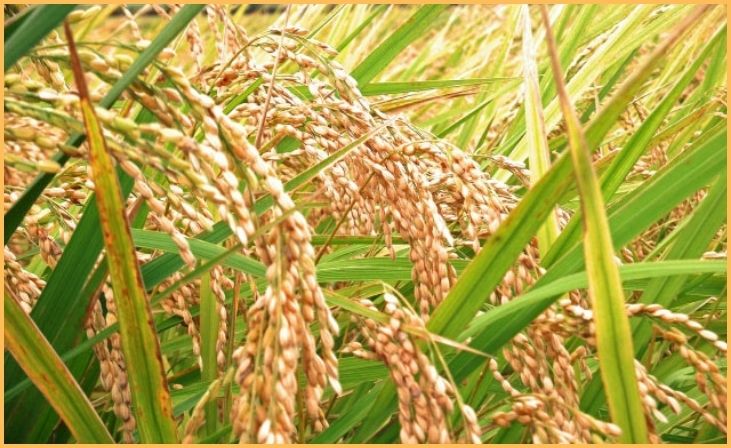Benefits of the Golden Grain – Wheat, often referred to as the “golden grain,” has a rich history deeply intertwined with the evolution of human civilizations. From ancient times to modern societies, this versatile and nutritious grain has sustained populations across the globe.
Its prevalence in various cultures is not accidental, as wheat boasts an array of health benefits that have made it a fundamental component of diets worldwide. Let’s delve deeper into the significance of wheat by exploring seven substantial advantages of incorporating this grain into your daily meals.
Benefits of the Golden Grain
1. Nutrient-Rich Goodness

Wheat stands out as a nutritional powerhouse, brimming with essential nutrients vital for maintaining overall health. Within its unassuming husk lies a treasure trove of dietary fiber, protein, vitamins, and minerals. Delving into its nutritional profile reveals the abundance of key nutrients such as:
- Fiber, known for its role in digestive health and overall well-being.
- Protein, essential for muscle development and various bodily functions.
- Vitamins, including B vitamins, which contribute to energy production and metabolism, as well as vitamin E, an antioxidant known for its skin and immune system benefits.
- Minerals like magnesium, zinc, and selenium, crucial for supporting various bodily functions, including heart health and immune function.
Also Read: Healthy Beans and Legumes
2. Aiding Digestive Health
One of the most notable health benefits of wheat comes from its high fiber content, which actively promotes digestive well-being. Fiber, the indigestible part of plant foods, plays a vital role in maintaining regular bowel movements and preventing gastrointestinal issues.
By adding bulk to the stool, fiber prevents constipation and keeps the digestive system functioning optimally. Additionally, a diet rich in fiber has been associated with a reduced risk of conditions such as diverticulitis and irritable bowel syndrome (IBS), underlining the importance of wheat in promoting digestive health.
3. Sustained Energy Release
Wheat, with its carbohydrate-rich composition, serves as an excellent source of sustained energy. Upon consumption, this grain facilitates a gradual and consistent release of energy, providing a reliable fuel source for daily activities.
Whether you’re navigating a hectic workday, engaging in intense exercise, or simply going about your routine, the enduring energy derived from wheat can help you remain active and mentally alert throughout the day.
4. Heart Health Benefits

Particularly in its whole form, wheat has garnered attention for its potential in promoting heart health. The fiber content in whole wheat plays a pivotal role in reducing cholesterol levels, thereby mitigating the risk of heart disease.
Moreover, the presence of essential nutrients such as magnesium and zinc in wheat contributes to maintaining optimal heart function. These micronutrients play crucial roles in regulating blood pressure and supporting overall cardiovascular health, highlighting the significance of incorporating wheat into a heart-healthy diet.
Also Read: 10 Best Muscle Building Foods for Women
5. Weight Management Support
For individuals seeking effective weight management strategies, wheat can serve as a valuable ally. The fiber content in wheat contributes to a prolonged feeling of fullness, promoting satiety and preventing overeating.
By incorporating wheat into your meals, you can effectively curb unhealthy cravings and regulate overall calorie intake. This simple dietary adjustment can significantly aid in weight management efforts, facilitating a healthier and more sustainable approach to maintaining a balanced body weight.
6. Blood Sugar Control
The benefits of wheat extend to individuals aiming to regulate blood sugar levels. Compared to refined grains, whole wheat exhibits a lower glycemic index, indicating a slower and more controlled increase in blood sugar levels upon consumption.
This characteristic renders wheat a favorable dietary option for individuals managing diabetes or those susceptible to developing the condition. By opting for whole wheat products, individuals can better control their blood sugar levels and reduce the risk of sudden spikes or fluctuations, thereby promoting overall metabolic stability.
7. Antioxidant Properties

Beyond its role as a nutritional powerhouse, wheat harbors antioxidant properties that contribute to overall health and well-being. Antioxidants such as selenium, found in significant quantities in wheat, play a pivotal role in safeguarding cells from oxidative damage.
By neutralizing harmful free radicals, these antioxidants help mitigate the risk of chronic diseases and support the body’s natural defense mechanisms.
The presence of such protective elements in wheat underscores its multifaceted contribution to overall health, positioning it as a valuable dietary inclusion for individuals seeking comprehensive wellness support.
Also Read: 10 Best Fast-Food Burgers In America
In conclusion, the incorporation of wheat into your diet can yield a multitude of health benefits, ranging from improved digestive health and sustained energy release to enhanced heart health, weight management support, and blood sugar control.
Its status as a nutrient-rich grain, coupled with its antioxidant properties, solidifies its position as a dietary staple that can significantly contribute to your overall well-being. Embracing the “golden grain” in your meals not only adds a wholesome and nourishing element to your diet but also serves as a simple yet impactful step towards cultivating a healthier lifestyle.
FAQs
Individuals with gluten sensitivity or celiac disease should exercise caution when consuming wheat, as it contains gluten, a protein that can trigger adverse reactions in these individuals. It is advisable for those with gluten-related disorders to opt for gluten-free alternatives or consult a healthcare professional for personalized dietary recommendations.
Incorporating wheat into your diet can be done through various means, such as consuming whole wheat bread, pasta, or cereals, and integrating wheat flour in baking recipes. Additionally, incorporating wheat-based salads, soups, and grain bowls can provide a wholesome and nutritious addition to your meals. It is essential to balance wheat consumption with a diverse range of nutrient-dense foods to create a well-rounded and balanced diet.

